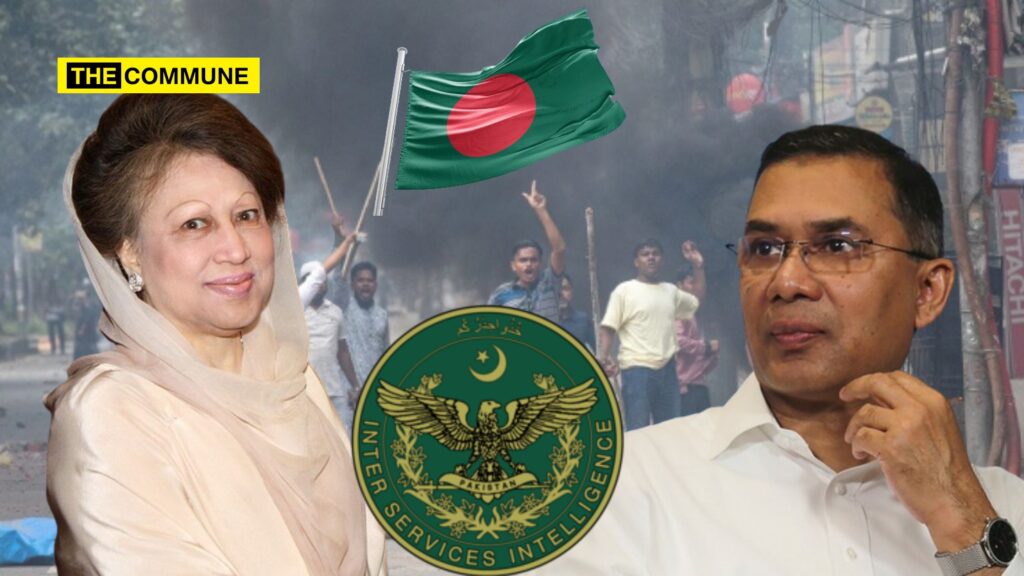Opposition leaders, including Tarique Rahman of the Bangladesh Nationalist Party (BNP), may be reportedly involved in clandestine meetings with Pakistan’s Inter-Services Intelligence (ISI) officials in Saudi Arabia to strategise violent regime change in Bangladesh.
These reports highlighting potential foreign interference in Bangladesh’s political dynamics emerge after BNP chief Khaleda Zia’s recent release.
Turmoil in Bangladesh
As we have been observing over the past few days, in a dramatic turn of events, Bangladesh’s political landscape has been upended, with Prime Minister Sheikh Hasina resigning and fleeing the country amid widespread protests. The upheaval, which led to over 300 deaths and many more injuries, was sparked by a controversial quota system for government jobs. It quickly morphed into a broader anti-government movement.
The Quota Controversy And Its Fallout
The unrest began with protests against a job quota system that allocated up to 30% of government positions to the families of veterans from Bangladesh’s 1971 war of independence against Pakistan. Despite a Supreme Court ruling reducing the quota to 5%, the discontent grew, culminating in demands for Hasina’s resignation. Violence escalated on 4 August 2024, leading to significant casualties and a crisis that forced Hasina to flee to India.
Intelligence Reports Point To Foreign Involvement
According to intelligence reports, the blueprint for regime change in Bangladesh was drafted in London with alleged involvement from Pakistan’s Inter-Services Intelligence (ISI). India Today reported evidence that meetings occurred between BNP’s Tarique Rahman, Khaleda Zia’s son, and ISI officials in Saudi Arabia. It is claimed that the ISI, in collaboration with China, aimed to destabilise Hasina’s government and reinstate the BNP, which is perceived as pro-Pakistan.
The protests were further fueled by “anti-Bangladesh” handles on social media, with over 500 negative posts targeting Hasina’s government, many originating from Pakistani accounts. The ISI-backed Islami Chhatra Shibir (ICS), the student wing of Jamaat-e-Islami Bangladesh, reportedly played a key role in escalating protests. Intelligence sources indicate that significant funding for these activities came from Chinese entities operating in Pakistan.
The Re-entry Of Khaleda Zia
In the wake of Hasina’s resignation, Bangladesh’s President Mohammed Shahabuddin announced the dissolution of Parliament and the formation of an interim government. Khaleda Zia, leader of the BNP and a long-time rival of Hasina, was released from house arrest.
Zia, who served as prime minister for two non-consecutive terms, now faces the challenge of navigating Bangladesh through this crisis. The release of Zia marks a new chapter in the “Battle of the Begums,” a rivalry that has long dominated Bangladeshi politics.
Battle Of The Begums
Khaleda Zia assumed BNP leadership in 1981 after her husband, then-President Zia-ur Rahman, was killed in a military coup. A decade later, she became Bangladesh’s first female prime minister. Her tenure as prime minister was marked by significant political and economic shifts, including introducing a parliamentary system and changes in foreign investment policies. Despite her contributions, her terms were marred by corruption allegations and the rise of Islamist militants. During her time in office, from 1991 to 1996 and again from 2001 to 2006, Zia’s administrations were frequently tainted by corruption allegations. As part of a negotiated arrangement to facilitate her return to politics, her two sons, who were also implicated in corruption charges during her second term, moved to the United Kingdom. At 78 years old, Khaleda Zia was convicted of corruption in 2018 and sentenced to 17 years in prison.
Sheikh Hasina, leader of the Awami League, was in power since 2009. Her tenure was characterised by economic growth and development, but a narrative of human rights abuses and corruption allegations also made the rounds. The intense rivalry between Hasina and Zia has often led to violence and political instability.
With Hasina’s departure and Zia’s return to prominence, the political dynamics in Bangladesh are likely to shift significantly. The interim government is expected to oversee elections soon, but the political landscape remains uncertain. The recent violence and unrest have highlighted ongoing issues in Bangladeshi politics, including allegations of foreign interference and domestic discontent.
The international community is watching closely as Bangladesh navigates this tumultuous period. These changes will affect regional stability and relations with neighbouring countries like India.
With Khaleda Zia now released, coupled with the news of her son and Muhammad Yunus flying into the country, it will be interesting to see how things unfold in Bangladesh.
Subscribe to our channels on Telegram, WhatsApp, and Instagram and get the best stories of the day delivered to you personally.

